外研版英语中考语言基础知识梳理与训练 第8课 八年级上册 Modules 4—6
文档属性
| 名称 | 外研版英语中考语言基础知识梳理与训练 第8课 八年级上册 Modules 4—6 | 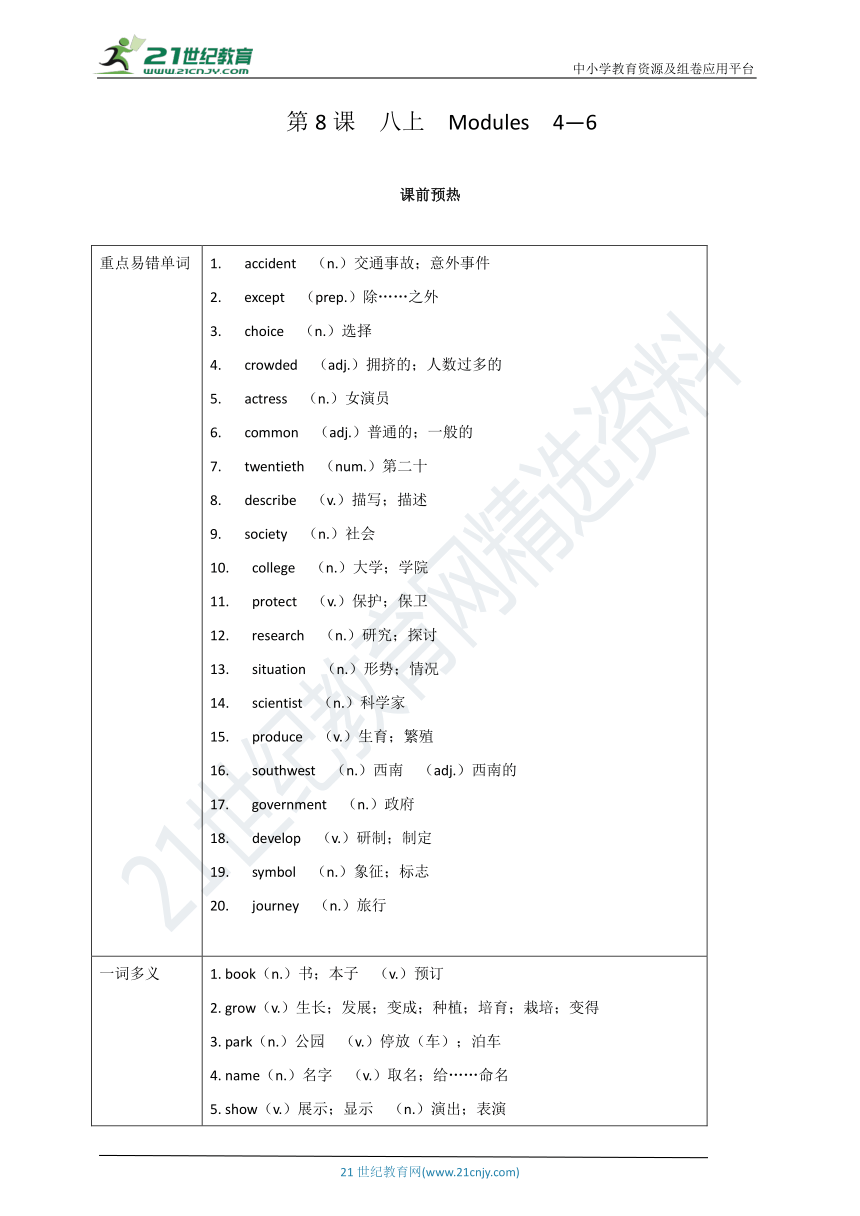 | |
| 格式 | doc | ||
| 文件大小 | 1.3MB | ||
| 资源类型 | 试卷 | ||
| 版本资源 | 外研版 | ||
| 科目 | 英语 | ||
| 更新时间 | 2022-02-06 09:10:03 | ||
图片预览

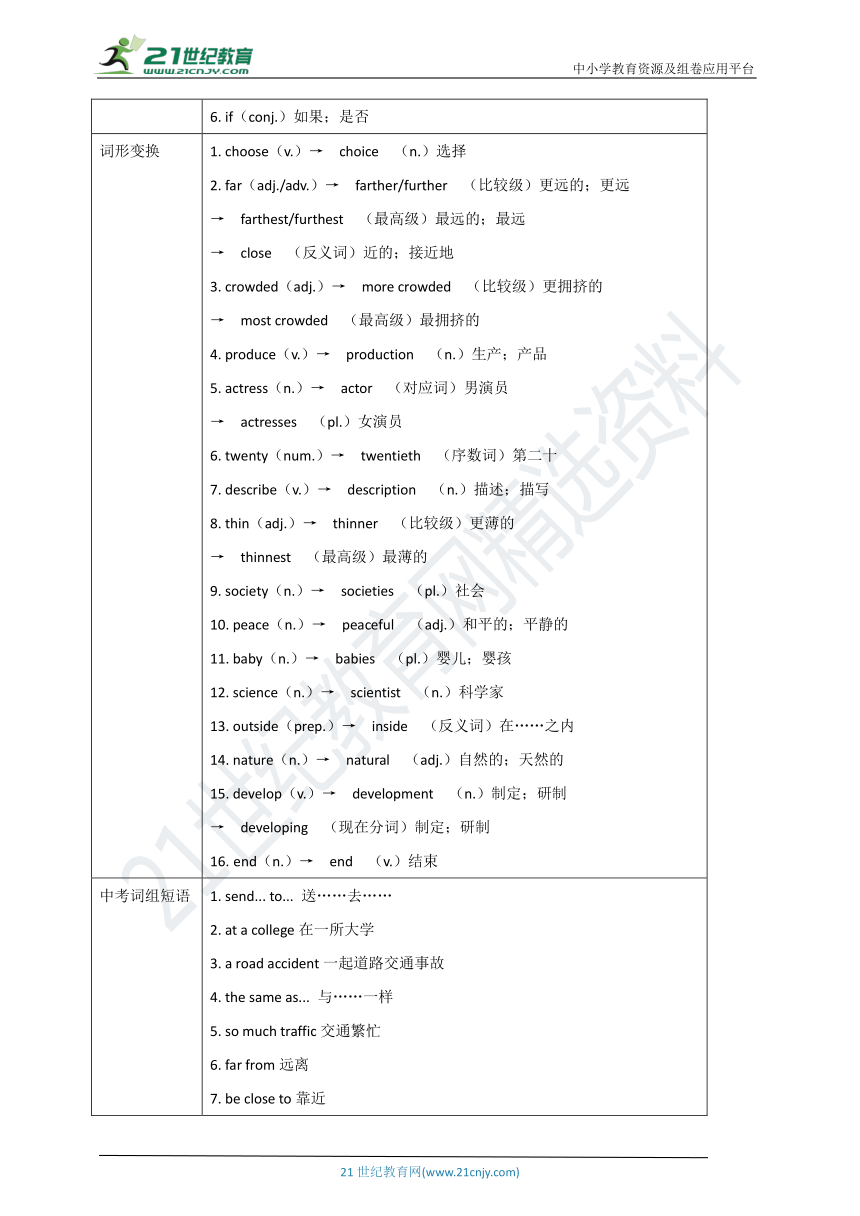
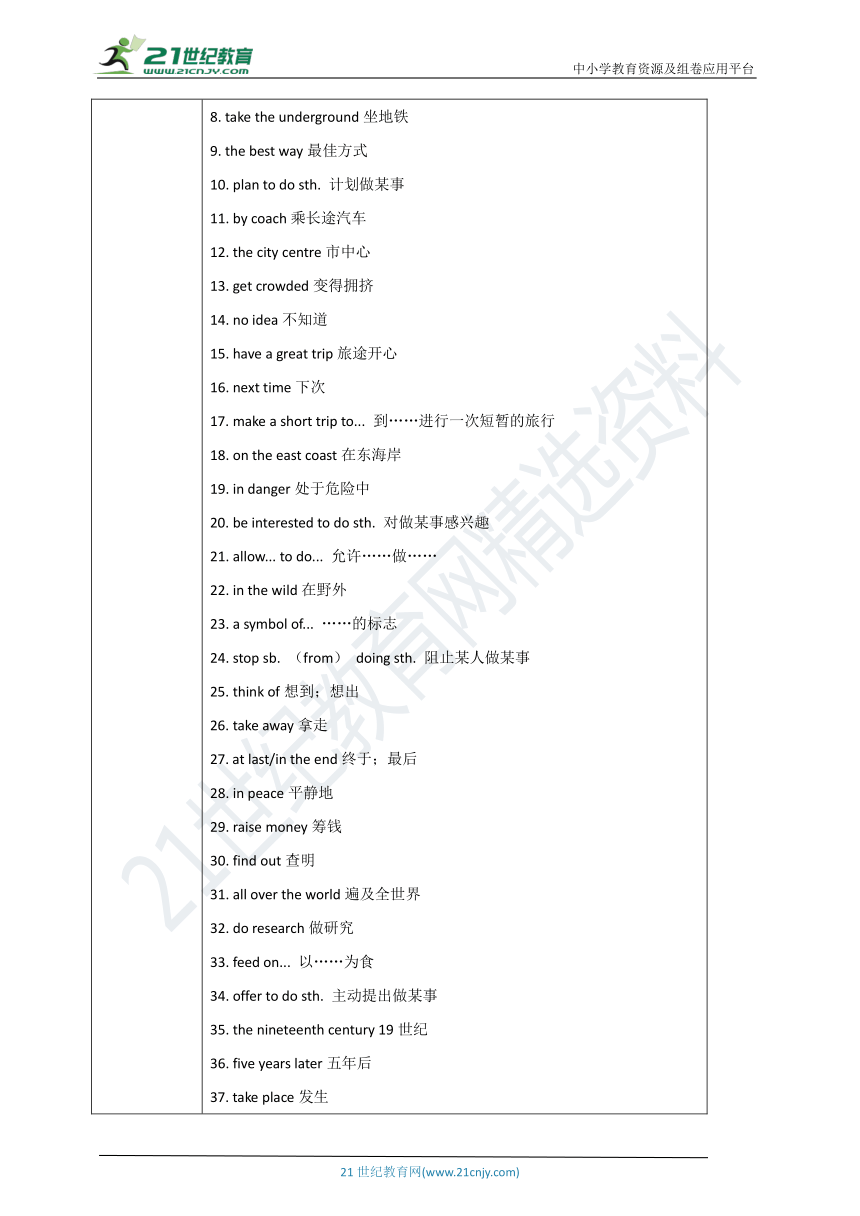
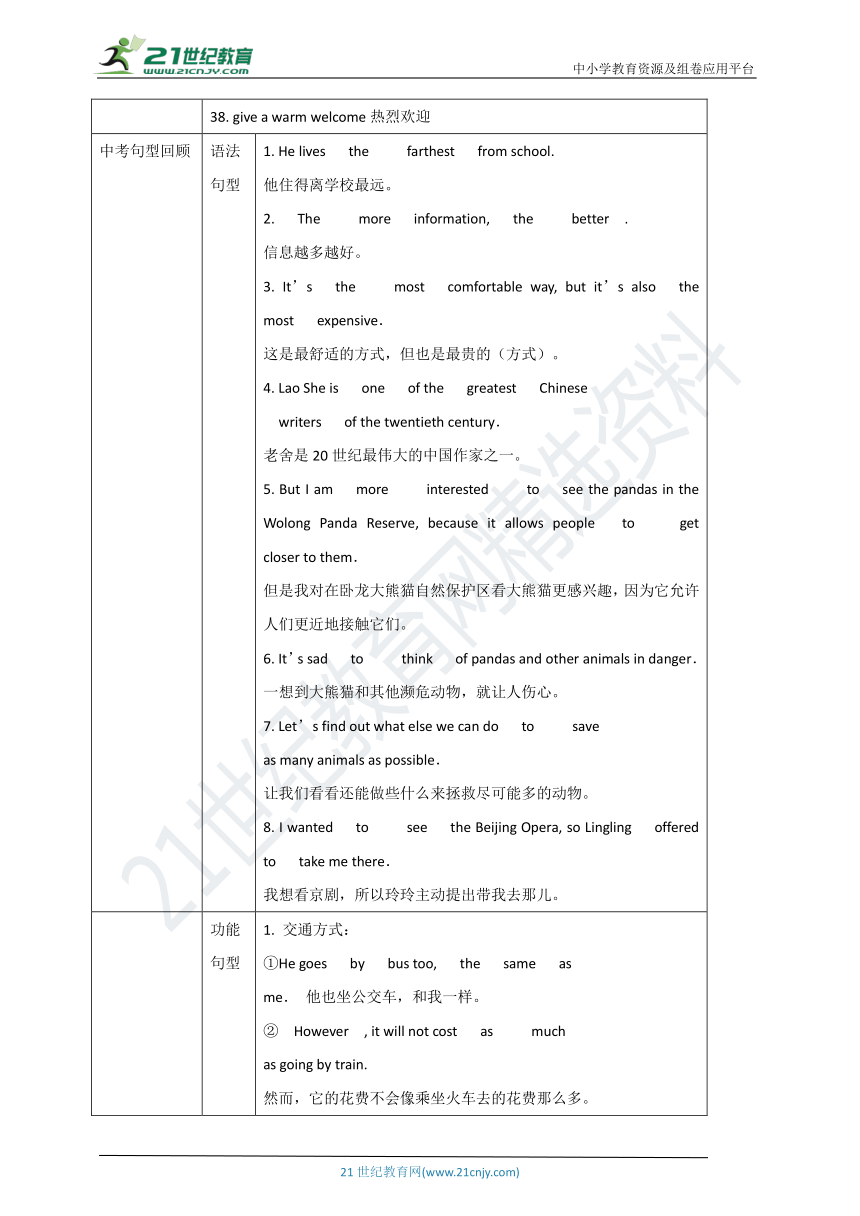
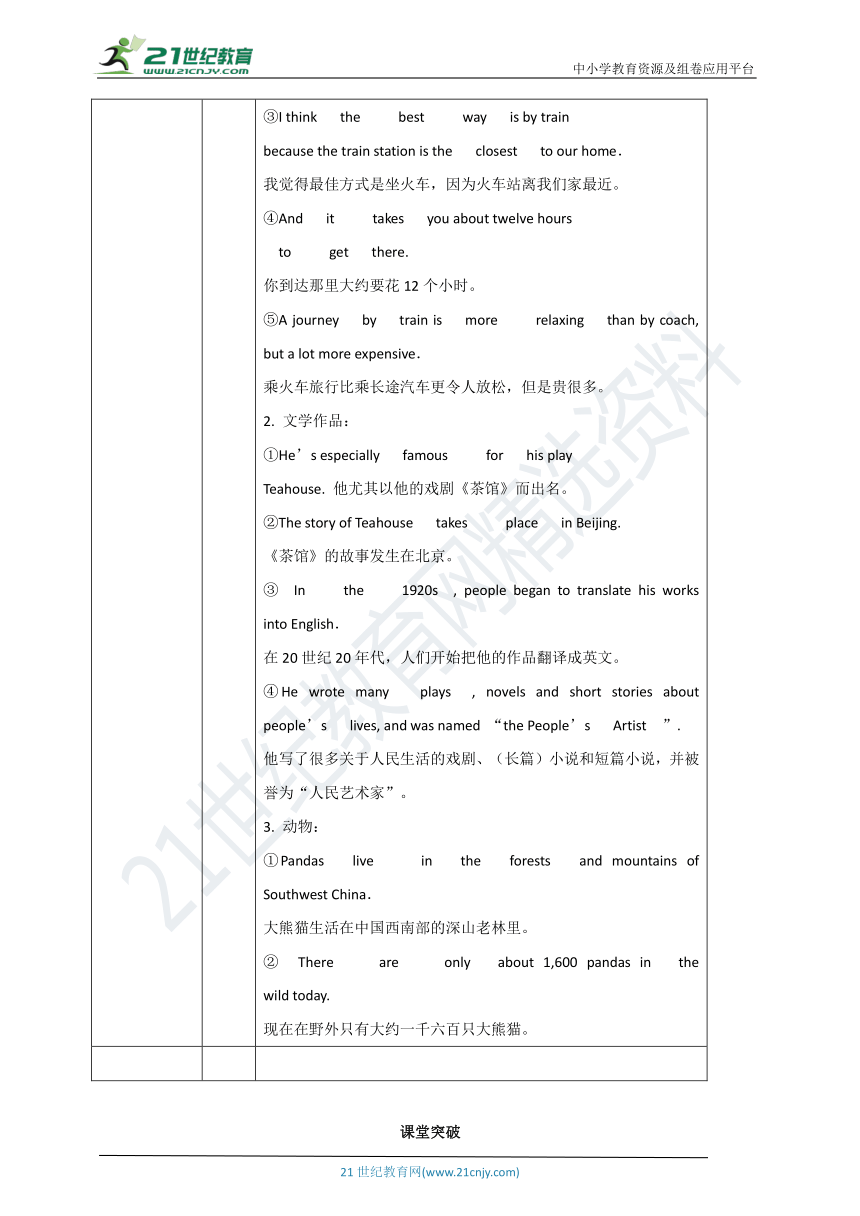
文档简介
中小学教育资源及组卷应用平台
第8课 八上 Modules 4—6
课前预热
重点易错单词 1. accident (n.)交通事故;意外事件2. except (prep.)除……之外3. choice (n.)选择4. crowded (adj.)拥挤的;人数过多的5. actress (n.)女演员6. common (adj.)普通的;一般的7. twentieth (num.)第二十8. describe (v.)描写;描述9. society (n.)社会10. college (n.)大学;学院11. protect (v.)保护;保卫12. research (n.)研究;探讨13. situation (n.)形势;情况14. scientist (n.)科学家15. produce (v.)生育;繁殖16. southwest (n.)西南 (adj.)西南的17. government (n.)政府18. develop (v.)研制;制定19. symbol (n.)象征;标志20. journey (n.)旅行
一词多义 1. book(n.)书;本子 (v.)预订2. grow(v.)生长;发展;变成;种植;培育;栽培;变得 3. park(n.)公园 (v.)停放(车);泊车4. name(n.)名字 (v.)取名;给……命名5. show(v.)展示;显示 (n.)演出;表演6. if(conj.)如果;是否
词形变换 1. choose(v.)→ choice (n.)选择2. far(adj./adv.)→ farther/further (比较级)更远的;更远→ farthest/furthest (最高级)最远的;最远→ close (反义词)近的;接近地3. crowded(adj.)→ more crowded (比较级)更拥挤的→ most crowded (最高级)最拥挤的4. produce(v.)→ production (n.)生产;产品5. actress(n.)→ actor (对应词)男演员→ actresses (pl.)女演员6. twenty(num.)→ twentieth (序数词)第二十7. describe(v.)→ description (n.)描述;描写8. thin(adj.)→ thinner (比较级)更薄的→ thinnest (最高级)最薄的9. society(n.)→ societies (pl.)社会10. peace(n.)→ peaceful (adj.)和平的;平静的11. baby(n.)→ babies (pl.)婴儿;婴孩12. science(n.)→ scientist (n.)科学家13. outside(prep.)→ inside (反义词)在……之内14. nature(n.)→ natural (adj.)自然的;天然的15. develop(v.)→ development (n.)制定;研制→ developing (现在分词)制定;研制end(n.)→ end (v.)结束
中考词组短语 1. send... to... 送……去……2. at a college在一所大学3. a road accident一起道路交通事故4. the same as... 与……一样5. so much traffic交通繁忙6. far from远离7. be close to靠近8. take the underground坐地铁9. the best way最佳方式10. plan to do sth. 计划做某事11. by coach乘长途汽车12. the city centre市中心13. get crowded变得拥挤14. no idea不知道15. have a great trip旅途开心16. next time下次17. make a short trip to... 到……进行一次短暂的旅行18. on the east coast在东海岸19. in danger处于危险中20. be interested to do sth. 对做某事感兴趣21. allow... to do... 允许……做……22. in the wild在野外 23. a symbol of... ……的标志24. stop sb. (from) doing sth. 阻止某人做某事25. think of想到;想出26. take away拿走27. at last/in the end终于;最后28. in peace平静地29. raise money筹钱30. find out查明31. all over the world遍及全世界32. do research做研究33. feed on... 以……为食34. offer to do sth. 主动提出做某事35. the nineteenth century 19世纪36. five years later五年后37. take place发生38. give a warm welcome热烈欢迎
中考句型回顾 语法句型 1. He lives the farthest from school.他住得离学校最远。2. The more information, the better .信息越多越好。3. It’s the most comfortable way, but it’s also the most expensive.这是最舒适的方式,但也是最贵的(方式)。4. Lao She is one of the greatest Chinese writers of the twentieth century.老舍是20世纪最伟大的中国作家之一。But I am more interested to see the pandas in the Wolong Panda Reserve, because it allows people to get closer to them.但是我对在卧龙大熊猫自然保护区看大熊猫更感兴趣,因为它允许人们更近地接触它们。6. It’s sad to think of pandas and other animals in danger.一想到大熊猫和其他濒危动物,就让人伤心。7. Let’s find out what else we can do to save as many animals as possible.让我们看看还能做些什么来拯救尽可能多的动物。8. I wanted to see the Beijing Opera, so Lingling offered to take me there.我想看京剧,所以玲玲主动提出带我去那儿。
功能句型 1. 交通方式:①He goes by bus too, the same as me. 他也坐公交车,和我一样。② However , it will not cost as much as going by train.然而,它的花费不会像乘坐火车去的花费那么多。③I think the best way is by trainbecause the train station is the closest to our home.我觉得最佳方式是坐火车,因为火车站离我们家最近。④And it takes you about twelve hours to get there. 你到达那里大约要花12个小时。⑤A journey by train is more relaxing than by coach, but a lot more expensive.乘火车旅行比乘长途汽车更令人放松,但是贵很多。2. 文学作品:①He’s especially famous for his playTeahouse. 他尤其以他的戏剧《茶馆》而出名。②The story of Teahouse takes place in Beijing.《茶馆》的故事发生在北京。③ In the 1920s , people began to translate his works into English. 在20世纪20年代,人们开始把他的作品翻译成英文。④He wrote many plays , novels and short stories about people’s lives, and was named “the People’s Artist ”.他写了很多关于人民生活的戏剧、(长篇)小说和短篇小说,并被誉为“人民艺术家”。3. 动物:①Pandas live in the forests and mountains of Southwest China.大熊猫生活在中国西南部的深山老林里。② There are only about 1,600 pandas in the wild today.现在在野外只有大约一千六百只大熊猫。
课堂突破
中考重点词汇精析
一、take
单词解析
v. 乘坐;买下;吃;喝;服(药);取走;拿走;带走;携带;持续;花费(时间);拍(照)。如:
①I usually take a bus to work.
我常常坐公共汽车去上班。
②We take two newspapers a day.
我们每天买两份报纸。
③Take your medicine. 把药服下。
④Who has taken my chocolate
是谁拿了我的巧克力?
⑤How long does the flight take
这个航班要飞多久?
⑥Byrd and his men took lots of photos of the mountains.
伯德和他的助手们拍了许多群山的照片。
常用短语:take after (外貌)相像;take off 起飞,脱下;take pictures/photos照相;take care of照顾,照料;take up占据(时间/空间);take it easy别紧张;take away拿走,夺走;take out of拿出,取出;take a risk/risks冒风险;take a seat坐下;take steps/measures to do sth. 采取措施做某事;take action (on)(对……)采取措施;take care当心;take... for example以……为例;take hold of抓住,吸引住;take it/things easy放松,不要过于紧张/劳累;take notes 做笔记;take notice (of) 注意,理会;take part (in) 参加,参与;take place发生,举行;take a walk散步;take pride in/be proud of... 为……感到自豪/骄傲;take one’s place/take the place of sb. 代替某人;take turns (to do sth.) 轮流(做某事)。
辨异突破
take, spend, cost与pay
这四个词都可以表示“花费”,但用法却不尽相同。
1. spend的主语必须是人,常用于以下结构:
spend time/money on sth./(in) doing sth.
在……/做某事上花费时间/金钱。
2. cost的主语是物,常用于以下结构:
sth. costs (sb.) +money 某物花了(某人)多少钱。
3. take常见用法为:
It takes/took sb.+time+to do sth. 做某事花费某人多少时间。(其中“it”是形式主语,真正的主语是“to do sth.”)
4. pay的主语通常是人,常用于以下结构:
(1)pay (sb.) money for sth. 付钱(给某人)买某物。
(2)pay for sth. 付某物的钱。
(3)pay for sb. 替某人付钱。
(4)pay sb. 付钱给某人。
(5)pay money back 还钱。
(6)pay off one’s money还清钱。
活学活用
A)填入适当的词或用所给词的适当形式填空。
1. I usually take_________________ walk with my dog.
2. It took him two hours_________________ (finish) his work yesterday.
3. Yuan Longping is such a great scientist that all of us take pride_________________ him.
4. Take_________________ easy, my boy. You can succeed.
5. The girl can take care_________________ herself well.
6. Miss Wang is ill and Mr Mao will take_________________ place of her.
7. The big table takes_________________ a lot of room.
8. Hurry up!The plane is taking_________________ soon.
B)根据句子意思和时态,用spend, take, cost和pay的正确形式填空。
9. I_________________ two hours on this maths problem yesterday.
10. The car_________________ him around ten thousand US dollars.
11. May I borrow 12 yuan from you I’ll_________________ it back next week.
12. They_________________ two years building this bridge.
13. A new computer_________________ a lot of money.
14. It_________________ them three years to build this road.
15. I have to_________________ them 20 pounds for this room each month.
16. I have to_________________ for the lost book.
二、enough
单词解析
1. pron. 足够;充分;充足。如:
Enough has been said about this problem.
有关这个问题,已经谈得够多了。
2. adj. 足够的。修饰名词,常放在被修饰名词之前。如:
We have enough time to get to the airport.
我们来得及赶到机场。
3. adv. 足够地;充分地。修饰形容词或副词,常放在被修饰形容词或副词之后。如:
You’re not driving fast enough.
你开车不够快。
活学活用
根据汉语意思翻译句子。(每空一词)
1. 这个房子对我们三个来说足够大。
The house is__________________________________ for us three.
2. 他有足够的钱买辆汽车。
He has__________________________________ to buy a car.
3. 我吃饱了。
I have had_________________ .
4. 他说话慢得每个人都能听懂。
He spoke__________________________________ for everyone to understand.
三、if
单词解析
conj. 如果,假使;是否,是不是。如:
①If you see him, give him this note.
你要是见到他,就把这个便条给他。
②Do you know if he has married
你知道他是否结婚了吗?
注意:if引导条件状语从句,常遵循“主将从现”原则,即:主句用一般将来时,从句用一般现在时。如:
If it does not rain tomorrow, we will go hiking. 如果明天不下雨,我们就去远足。
常用短语:even if即使;if only要是……就好了;only if只有;as if好像;what if倘若……。
辨异突破
if与whether
if和whether都可以引导从句,意为“是否”。但以下几种情况只能使用whether而不能使用if:
1. 引导主语从句时。如:
Whether we shall attend the meeting hasn’t been decided yet.
2. 引导表语从句时。如:
The question is whether the film is worth seeing.
3. 引导同位语从句时。如:
Please answer my question whether you are coming.
4. 引导动词后面的宾语从句置于句首时。如:Whether she is married I don’t know.
5. 引导动词后面的宾语从句表示选择概念时。如:
He wondered whether he should wait for them or go on.
6. 引导动词后面的宾语从句,后面紧接or not时。如:
He asked me whether or not I would come.
7. 引导介词后面的宾语从句时。如:
It all depends on whether they will support us.
8. 后接动词不定式作宾语时。如:
He doesn’t know whether to stay (or not).
9. 为了避免与表示条件的if重复或为了避免产生歧义时,常使用whether。如:
Please let me know if you like it. 该句可译为“请告诉我你是否喜欢。”或“如果你喜欢,请告诉我。”如果使用whether就可以避免产生歧义。
活学活用
填入适当的词或用所给词的适当形式填空。
1. He wondered_________________ he should go there by air or by sea.
2. I don’t know if he_________________ (come) tomorrow.
3. If he_________________ (come), I’ll call you.
4._________________ you need money, I can lend you some.
5. Would you mind_________________ I open a window
6. I wouldn’t tell you even_________________ I knew.
7. I don’t know_________________ to believe him.
8. I don’t care_________________ or not you’ll stay.
四、offer
单词解析
1. n. 提供;建议。如:
Thank you for your kind offer of help.
谢谢你的好心帮助。
2. vt. 提供;建议。如:
Peter offered to teach them water-skiing.
彼得主动提出教他们滑水。
辨异突破
offer与provide
两者都可意为“供给;提供”,但用法不同。
1. provide指有远见,为应付意外、紧急情况等做好充分准备而“供给;提供”,可用于provide sb. (with sth.)或provide sth. (for sb.)结构。如:
①The school provided food for the students.
=The school provided the students with food.
学校为学生提供伙食。
②They provided some necessary support for the sufferers.
他们为受难者提供了一些必要的援助。
2. offer侧重表示“愿意给予”,常用于offer sb. sth., offer sth. to sb.或offer to do sth.结构。如:
①He offered me a job, but I didn’t accept.
他给我提供了一份工作,但是我没有接受。
②He sometimes offers money to the homeless.
=He sometimes offers the homeless money.
他有时会给无家可归的人一些钱。
③He offered to go instead of me.
他主动提出代替我去。
活学活用
填入适当的词或用所给词的适当形式填空。
1. He offered_________________ (lend) me some books.
2. He offered a glass of wine_________________ me.
3. Sheep provide us_________________ wool.
4. The villagers provided food_________________ the children.
5. The old man offered_________________ (we) some good ideas.
6. The Internet provides us_________________ plenty of information.
7. If your parents are having problems, you should offer_________________ (help).
五、except
单词解析
prep. 除……之外。如:
We work every day except Sunday.
我们除星期天外每天都工作。
辨异突破
except与except for
两者都意为“除……以外;除去”,两者有时可以通用。如:
Everyone is here except/except for Anna.
除了安娜外,大家都到了。
但两者有时又有一些区别:
1. except表示同类事物间的关系。如:
①We all went to the park except Tom.
我们都去了公园,除了汤姆。
②But nobody was late, except me.
但是没有人迟到,除了我。
2. except for用于表示对主要部分的肯定和对局部的否定,它不表示同类事物之间的关系。如:
①I can answer all the questions except for the last one.
除了最后一题外,所有题目我都可以解答。
②Mr Smith is a good man, except for his bad temper.
除了脾气不好外,史密斯先生是个好人。
活学活用
用except或except for填空。
1. All the students are having class_________________Daming. He is at home because of illness.
2. Your composition is wonderful_________________ some spelling mistakes.
3. We all succeeded_________________ Tom.
4. Your compositions are wonderful_________________ Li Hua’s.
5._________________ Journey to the West, she has also read Little Women.
六、raise
单词解析
v. 筹集(钱款);抚养;养育。如:
We are raising money for charity.
我们在进行慈善募捐。
辨异突破
raise与rise
两者都可意为“上升”,但它们有区别。
1. raise是及物动词,后面必须有宾语,即“某人把某物举起来”。如:
①I raised the box above my head.
我把盒子举过了头顶。(盒子是我举起的,所以用raise)
②We will have to raise our fees.
我们将不得不提高费用。(raise后面一定要有宾语)
③He raised his right hand. 他举起了右手。
相关短语:raise money集资,筹款;raise animals养动物;raise prices提价;raise one’s voice提高嗓门;raise (one’s) hand(s)举手;raise a family养家。
2. rise是不及物动词,后面不能加宾语,也就是说“某人、某物自己升起来”。如:
①The waves rose and fell. 波浪起起伏伏。(波浪是自己动的,所以用rise)
②Prices rose rapidly. 价格快速上涨。(rise为不及物动词,后面一定不能有宾语)
③Smoke rose into the sky. 空中升起了烟。
活学活用
用raise或 rise的适当形式填空。
1. We_______________ our heads to watch the sun_____________ over the bridge just now.
2. The sun_________________ in the east.
3. A lot of money was_________________ in this activity.
4. I can’t hear you clearly. Please_________________ your voice.
5. She stopped her work and_________________ her head.
中考重点句型精析
The more information, the better.
信息越多越好。
句型解析
“the+比较级,the+比较级”意为“越……,就越……”。如:
①The more we get together, the happier we’ll be.
相聚越多,我们就越高兴。
②The more, the better. 越多越好。
③The sooner, the better. 越快越好。
④The more friends you have, the happier you will be. 朋友越多越快乐。
活学活用
用所给词的适当形式填空。
1. The_______________ (careful) you are, the______________(few) mistakes you will make.
2. The_______________ (much) exercise you take, the_____________ (health) you will be.
3. The_________________ (quick) you run, the more risk you will take.
4. The_________________ we read, the_________________ we know. (much)
当堂检测
一、选词填空
用方框中所给词语的适当形式填空。每词限用一次。
schoolbag fever artist day catch a cold
1. Dad has a high_________________ , but he still goes to work.
2. In Paris you can easily meet a group of young_________________.
3. Exercise has become part of my_________________ routine.
4. You’ll_________________ if you don’t wear a sweater.
5. Our project provided 1,000_________________ for the students in poor areas.
二、单词拼写
1. You can have any of the cakes_________________ (除了) this one.
2. It_________________ (花费) me three days to find a present for Dad.
3. The rooms are all large_________________ (足够) to take a third bed.
4. I want to get back by five o’clock_________________ (如果) possible.
5._________________ (举起) your hand if you know the right answer.
6. They_________________ (提供) him a very good job, but he turned it down.
7. The narrow roads were_________________ (拥挤的) with holiday traffic.
8. Physical exercise can_________________ (保护) you against heart disease.
9. You have a______________ (选择)—you can stay here on your own or you can come with us.
10. Tomorrow is my______________ (第二十) birthday. I’m really looking forward to my party.
三、语法填空
阅读下面短文,在空白处填入一个适当的词,或填入括号中所给单词的正确形式。
Tani, 8 years old, ran away from Nigeria with his family two years ago. 1_________________ they got to the United States, a churchman 2_________________(warm) helped place them in a homeless shelter (收容所) in New York. Tani’s dad worked as a driver. And his mum studied hard 3_________________(become) a nurse. Tani started going to Primary School 116. There, 4_________________ learnt to play the game that would change his life: chess.
On March 10th, Tani 5_________________(win) a state champion(冠军) for little kids. He beat 73 other players. Some had practised with private chess teachers, but Tani had practised on 6_________________ floor of the homeless shelter alone.
A reporter wrote an article about Tani. In three weeks, thousands 7_________________ people gave away over $250,000 to Tani and his family on GoFundMe. Some also left 8_________________(message). “Tani! You are a superstar!” one person wrote.
Recently, Tani and his family 9_________________(decide) to give away all the money. “Thanks to others’ help, we live much 10_________________(happily) than before,” Tani’s father, Kayode, told TIME for Kids. “Now we want to help poor people.”
参考答案
第8课 八上 Modules 4—6
课堂突破
【中考重点词汇精析】
一、1. a 2. to finish 3. in 4. it 5. of 6. the 7. up
8. off 9. spent 10. cost 11. pay 12. spent 13. costs
14. took 15. pay 16. pay
二、1. big enough 2. enough money 3. enough
4. slowly enough
三、1. whether 2. will come 3. comes 4. If 5. if 6. if
7. whether 8. whether
四、1. to lend 2. to 3. with 4. for 5. us 6. with
7. to help
五、1. except 2. except for 3. except 4. except
5. Except for
六、1. raised, rise 2. rises 3. raised 4. raise 5. raised
【中考重点句型精析】
1. more careful, fewer 2. more, healthier 3. more quickly
4. more, more
当堂检测
一、1. fever 2. artists 3. daily 4. catch a cold 5. schoolbags
二、1. except 2. took 3. enough 4. if 5. Raise 6. offered
7. crowded 8. protect 9. choice 10. twentieth
三、1. When/After 2. warmly 3. to become 4. he 5. won
6. the 7. of 8. messages 9. have decided 10. more happily
21世纪教育网 www.21cnjy.com 精品试卷·第 2 页 (共 2 页)
HYPERLINK "http://21世纪教育网(www.21cnjy.com)
" 21世纪教育网(www.21cnjy.com)
第8课 八上 Modules 4—6
课前预热
重点易错单词 1. accident (n.)交通事故;意外事件2. except (prep.)除……之外3. choice (n.)选择4. crowded (adj.)拥挤的;人数过多的5. actress (n.)女演员6. common (adj.)普通的;一般的7. twentieth (num.)第二十8. describe (v.)描写;描述9. society (n.)社会10. college (n.)大学;学院11. protect (v.)保护;保卫12. research (n.)研究;探讨13. situation (n.)形势;情况14. scientist (n.)科学家15. produce (v.)生育;繁殖16. southwest (n.)西南 (adj.)西南的17. government (n.)政府18. develop (v.)研制;制定19. symbol (n.)象征;标志20. journey (n.)旅行
一词多义 1. book(n.)书;本子 (v.)预订2. grow(v.)生长;发展;变成;种植;培育;栽培;变得 3. park(n.)公园 (v.)停放(车);泊车4. name(n.)名字 (v.)取名;给……命名5. show(v.)展示;显示 (n.)演出;表演6. if(conj.)如果;是否
词形变换 1. choose(v.)→ choice (n.)选择2. far(adj./adv.)→ farther/further (比较级)更远的;更远→ farthest/furthest (最高级)最远的;最远→ close (反义词)近的;接近地3. crowded(adj.)→ more crowded (比较级)更拥挤的→ most crowded (最高级)最拥挤的4. produce(v.)→ production (n.)生产;产品5. actress(n.)→ actor (对应词)男演员→ actresses (pl.)女演员6. twenty(num.)→ twentieth (序数词)第二十7. describe(v.)→ description (n.)描述;描写8. thin(adj.)→ thinner (比较级)更薄的→ thinnest (最高级)最薄的9. society(n.)→ societies (pl.)社会10. peace(n.)→ peaceful (adj.)和平的;平静的11. baby(n.)→ babies (pl.)婴儿;婴孩12. science(n.)→ scientist (n.)科学家13. outside(prep.)→ inside (反义词)在……之内14. nature(n.)→ natural (adj.)自然的;天然的15. develop(v.)→ development (n.)制定;研制→ developing (现在分词)制定;研制end(n.)→ end (v.)结束
中考词组短语 1. send... to... 送……去……2. at a college在一所大学3. a road accident一起道路交通事故4. the same as... 与……一样5. so much traffic交通繁忙6. far from远离7. be close to靠近8. take the underground坐地铁9. the best way最佳方式10. plan to do sth. 计划做某事11. by coach乘长途汽车12. the city centre市中心13. get crowded变得拥挤14. no idea不知道15. have a great trip旅途开心16. next time下次17. make a short trip to... 到……进行一次短暂的旅行18. on the east coast在东海岸19. in danger处于危险中20. be interested to do sth. 对做某事感兴趣21. allow... to do... 允许……做……22. in the wild在野外 23. a symbol of... ……的标志24. stop sb. (from) doing sth. 阻止某人做某事25. think of想到;想出26. take away拿走27. at last/in the end终于;最后28. in peace平静地29. raise money筹钱30. find out查明31. all over the world遍及全世界32. do research做研究33. feed on... 以……为食34. offer to do sth. 主动提出做某事35. the nineteenth century 19世纪36. five years later五年后37. take place发生38. give a warm welcome热烈欢迎
中考句型回顾 语法句型 1. He lives the farthest from school.他住得离学校最远。2. The more information, the better .信息越多越好。3. It’s the most comfortable way, but it’s also the most expensive.这是最舒适的方式,但也是最贵的(方式)。4. Lao She is one of the greatest Chinese writers of the twentieth century.老舍是20世纪最伟大的中国作家之一。But I am more interested to see the pandas in the Wolong Panda Reserve, because it allows people to get closer to them.但是我对在卧龙大熊猫自然保护区看大熊猫更感兴趣,因为它允许人们更近地接触它们。6. It’s sad to think of pandas and other animals in danger.一想到大熊猫和其他濒危动物,就让人伤心。7. Let’s find out what else we can do to save as many animals as possible.让我们看看还能做些什么来拯救尽可能多的动物。8. I wanted to see the Beijing Opera, so Lingling offered to take me there.我想看京剧,所以玲玲主动提出带我去那儿。
功能句型 1. 交通方式:①He goes by bus too, the same as me. 他也坐公交车,和我一样。② However , it will not cost as much as going by train.然而,它的花费不会像乘坐火车去的花费那么多。③I think the best way is by trainbecause the train station is the closest to our home.我觉得最佳方式是坐火车,因为火车站离我们家最近。④And it takes you about twelve hours to get there. 你到达那里大约要花12个小时。⑤A journey by train is more relaxing than by coach, but a lot more expensive.乘火车旅行比乘长途汽车更令人放松,但是贵很多。2. 文学作品:①He’s especially famous for his playTeahouse. 他尤其以他的戏剧《茶馆》而出名。②The story of Teahouse takes place in Beijing.《茶馆》的故事发生在北京。③ In the 1920s , people began to translate his works into English. 在20世纪20年代,人们开始把他的作品翻译成英文。④He wrote many plays , novels and short stories about people’s lives, and was named “the People’s Artist ”.他写了很多关于人民生活的戏剧、(长篇)小说和短篇小说,并被誉为“人民艺术家”。3. 动物:①Pandas live in the forests and mountains of Southwest China.大熊猫生活在中国西南部的深山老林里。② There are only about 1,600 pandas in the wild today.现在在野外只有大约一千六百只大熊猫。
课堂突破
中考重点词汇精析
一、take
单词解析
v. 乘坐;买下;吃;喝;服(药);取走;拿走;带走;携带;持续;花费(时间);拍(照)。如:
①I usually take a bus to work.
我常常坐公共汽车去上班。
②We take two newspapers a day.
我们每天买两份报纸。
③Take your medicine. 把药服下。
④Who has taken my chocolate
是谁拿了我的巧克力?
⑤How long does the flight take
这个航班要飞多久?
⑥Byrd and his men took lots of photos of the mountains.
伯德和他的助手们拍了许多群山的照片。
常用短语:take after (外貌)相像;take off 起飞,脱下;take pictures/photos照相;take care of照顾,照料;take up占据(时间/空间);take it easy别紧张;take away拿走,夺走;take out of拿出,取出;take a risk/risks冒风险;take a seat坐下;take steps/measures to do sth. 采取措施做某事;take action (on)(对……)采取措施;take care当心;take... for example以……为例;take hold of抓住,吸引住;take it/things easy放松,不要过于紧张/劳累;take notes 做笔记;take notice (of) 注意,理会;take part (in) 参加,参与;take place发生,举行;take a walk散步;take pride in/be proud of... 为……感到自豪/骄傲;take one’s place/take the place of sb. 代替某人;take turns (to do sth.) 轮流(做某事)。
辨异突破
take, spend, cost与pay
这四个词都可以表示“花费”,但用法却不尽相同。
1. spend的主语必须是人,常用于以下结构:
spend time/money on sth./(in) doing sth.
在……/做某事上花费时间/金钱。
2. cost的主语是物,常用于以下结构:
sth. costs (sb.) +money 某物花了(某人)多少钱。
3. take常见用法为:
It takes/took sb.+time+to do sth. 做某事花费某人多少时间。(其中“it”是形式主语,真正的主语是“to do sth.”)
4. pay的主语通常是人,常用于以下结构:
(1)pay (sb.) money for sth. 付钱(给某人)买某物。
(2)pay for sth. 付某物的钱。
(3)pay for sb. 替某人付钱。
(4)pay sb. 付钱给某人。
(5)pay money back 还钱。
(6)pay off one’s money还清钱。
活学活用
A)填入适当的词或用所给词的适当形式填空。
1. I usually take_________________ walk with my dog.
2. It took him two hours_________________ (finish) his work yesterday.
3. Yuan Longping is such a great scientist that all of us take pride_________________ him.
4. Take_________________ easy, my boy. You can succeed.
5. The girl can take care_________________ herself well.
6. Miss Wang is ill and Mr Mao will take_________________ place of her.
7. The big table takes_________________ a lot of room.
8. Hurry up!The plane is taking_________________ soon.
B)根据句子意思和时态,用spend, take, cost和pay的正确形式填空。
9. I_________________ two hours on this maths problem yesterday.
10. The car_________________ him around ten thousand US dollars.
11. May I borrow 12 yuan from you I’ll_________________ it back next week.
12. They_________________ two years building this bridge.
13. A new computer_________________ a lot of money.
14. It_________________ them three years to build this road.
15. I have to_________________ them 20 pounds for this room each month.
16. I have to_________________ for the lost book.
二、enough
单词解析
1. pron. 足够;充分;充足。如:
Enough has been said about this problem.
有关这个问题,已经谈得够多了。
2. adj. 足够的。修饰名词,常放在被修饰名词之前。如:
We have enough time to get to the airport.
我们来得及赶到机场。
3. adv. 足够地;充分地。修饰形容词或副词,常放在被修饰形容词或副词之后。如:
You’re not driving fast enough.
你开车不够快。
活学活用
根据汉语意思翻译句子。(每空一词)
1. 这个房子对我们三个来说足够大。
The house is__________________________________ for us three.
2. 他有足够的钱买辆汽车。
He has__________________________________ to buy a car.
3. 我吃饱了。
I have had_________________ .
4. 他说话慢得每个人都能听懂。
He spoke__________________________________ for everyone to understand.
三、if
单词解析
conj. 如果,假使;是否,是不是。如:
①If you see him, give him this note.
你要是见到他,就把这个便条给他。
②Do you know if he has married
你知道他是否结婚了吗?
注意:if引导条件状语从句,常遵循“主将从现”原则,即:主句用一般将来时,从句用一般现在时。如:
If it does not rain tomorrow, we will go hiking. 如果明天不下雨,我们就去远足。
常用短语:even if即使;if only要是……就好了;only if只有;as if好像;what if倘若……。
辨异突破
if与whether
if和whether都可以引导从句,意为“是否”。但以下几种情况只能使用whether而不能使用if:
1. 引导主语从句时。如:
Whether we shall attend the meeting hasn’t been decided yet.
2. 引导表语从句时。如:
The question is whether the film is worth seeing.
3. 引导同位语从句时。如:
Please answer my question whether you are coming.
4. 引导动词后面的宾语从句置于句首时。如:Whether she is married I don’t know.
5. 引导动词后面的宾语从句表示选择概念时。如:
He wondered whether he should wait for them or go on.
6. 引导动词后面的宾语从句,后面紧接or not时。如:
He asked me whether or not I would come.
7. 引导介词后面的宾语从句时。如:
It all depends on whether they will support us.
8. 后接动词不定式作宾语时。如:
He doesn’t know whether to stay (or not).
9. 为了避免与表示条件的if重复或为了避免产生歧义时,常使用whether。如:
Please let me know if you like it. 该句可译为“请告诉我你是否喜欢。”或“如果你喜欢,请告诉我。”如果使用whether就可以避免产生歧义。
活学活用
填入适当的词或用所给词的适当形式填空。
1. He wondered_________________ he should go there by air or by sea.
2. I don’t know if he_________________ (come) tomorrow.
3. If he_________________ (come), I’ll call you.
4._________________ you need money, I can lend you some.
5. Would you mind_________________ I open a window
6. I wouldn’t tell you even_________________ I knew.
7. I don’t know_________________ to believe him.
8. I don’t care_________________ or not you’ll stay.
四、offer
单词解析
1. n. 提供;建议。如:
Thank you for your kind offer of help.
谢谢你的好心帮助。
2. vt. 提供;建议。如:
Peter offered to teach them water-skiing.
彼得主动提出教他们滑水。
辨异突破
offer与provide
两者都可意为“供给;提供”,但用法不同。
1. provide指有远见,为应付意外、紧急情况等做好充分准备而“供给;提供”,可用于provide sb. (with sth.)或provide sth. (for sb.)结构。如:
①The school provided food for the students.
=The school provided the students with food.
学校为学生提供伙食。
②They provided some necessary support for the sufferers.
他们为受难者提供了一些必要的援助。
2. offer侧重表示“愿意给予”,常用于offer sb. sth., offer sth. to sb.或offer to do sth.结构。如:
①He offered me a job, but I didn’t accept.
他给我提供了一份工作,但是我没有接受。
②He sometimes offers money to the homeless.
=He sometimes offers the homeless money.
他有时会给无家可归的人一些钱。
③He offered to go instead of me.
他主动提出代替我去。
活学活用
填入适当的词或用所给词的适当形式填空。
1. He offered_________________ (lend) me some books.
2. He offered a glass of wine_________________ me.
3. Sheep provide us_________________ wool.
4. The villagers provided food_________________ the children.
5. The old man offered_________________ (we) some good ideas.
6. The Internet provides us_________________ plenty of information.
7. If your parents are having problems, you should offer_________________ (help).
五、except
单词解析
prep. 除……之外。如:
We work every day except Sunday.
我们除星期天外每天都工作。
辨异突破
except与except for
两者都意为“除……以外;除去”,两者有时可以通用。如:
Everyone is here except/except for Anna.
除了安娜外,大家都到了。
但两者有时又有一些区别:
1. except表示同类事物间的关系。如:
①We all went to the park except Tom.
我们都去了公园,除了汤姆。
②But nobody was late, except me.
但是没有人迟到,除了我。
2. except for用于表示对主要部分的肯定和对局部的否定,它不表示同类事物之间的关系。如:
①I can answer all the questions except for the last one.
除了最后一题外,所有题目我都可以解答。
②Mr Smith is a good man, except for his bad temper.
除了脾气不好外,史密斯先生是个好人。
活学活用
用except或except for填空。
1. All the students are having class_________________Daming. He is at home because of illness.
2. Your composition is wonderful_________________ some spelling mistakes.
3. We all succeeded_________________ Tom.
4. Your compositions are wonderful_________________ Li Hua’s.
5._________________ Journey to the West, she has also read Little Women.
六、raise
单词解析
v. 筹集(钱款);抚养;养育。如:
We are raising money for charity.
我们在进行慈善募捐。
辨异突破
raise与rise
两者都可意为“上升”,但它们有区别。
1. raise是及物动词,后面必须有宾语,即“某人把某物举起来”。如:
①I raised the box above my head.
我把盒子举过了头顶。(盒子是我举起的,所以用raise)
②We will have to raise our fees.
我们将不得不提高费用。(raise后面一定要有宾语)
③He raised his right hand. 他举起了右手。
相关短语:raise money集资,筹款;raise animals养动物;raise prices提价;raise one’s voice提高嗓门;raise (one’s) hand(s)举手;raise a family养家。
2. rise是不及物动词,后面不能加宾语,也就是说“某人、某物自己升起来”。如:
①The waves rose and fell. 波浪起起伏伏。(波浪是自己动的,所以用rise)
②Prices rose rapidly. 价格快速上涨。(rise为不及物动词,后面一定不能有宾语)
③Smoke rose into the sky. 空中升起了烟。
活学活用
用raise或 rise的适当形式填空。
1. We_______________ our heads to watch the sun_____________ over the bridge just now.
2. The sun_________________ in the east.
3. A lot of money was_________________ in this activity.
4. I can’t hear you clearly. Please_________________ your voice.
5. She stopped her work and_________________ her head.
中考重点句型精析
The more information, the better.
信息越多越好。
句型解析
“the+比较级,the+比较级”意为“越……,就越……”。如:
①The more we get together, the happier we’ll be.
相聚越多,我们就越高兴。
②The more, the better. 越多越好。
③The sooner, the better. 越快越好。
④The more friends you have, the happier you will be. 朋友越多越快乐。
活学活用
用所给词的适当形式填空。
1. The_______________ (careful) you are, the______________(few) mistakes you will make.
2. The_______________ (much) exercise you take, the_____________ (health) you will be.
3. The_________________ (quick) you run, the more risk you will take.
4. The_________________ we read, the_________________ we know. (much)
当堂检测
一、选词填空
用方框中所给词语的适当形式填空。每词限用一次。
schoolbag fever artist day catch a cold
1. Dad has a high_________________ , but he still goes to work.
2. In Paris you can easily meet a group of young_________________.
3. Exercise has become part of my_________________ routine.
4. You’ll_________________ if you don’t wear a sweater.
5. Our project provided 1,000_________________ for the students in poor areas.
二、单词拼写
1. You can have any of the cakes_________________ (除了) this one.
2. It_________________ (花费) me three days to find a present for Dad.
3. The rooms are all large_________________ (足够) to take a third bed.
4. I want to get back by five o’clock_________________ (如果) possible.
5._________________ (举起) your hand if you know the right answer.
6. They_________________ (提供) him a very good job, but he turned it down.
7. The narrow roads were_________________ (拥挤的) with holiday traffic.
8. Physical exercise can_________________ (保护) you against heart disease.
9. You have a______________ (选择)—you can stay here on your own or you can come with us.
10. Tomorrow is my______________ (第二十) birthday. I’m really looking forward to my party.
三、语法填空
阅读下面短文,在空白处填入一个适当的词,或填入括号中所给单词的正确形式。
Tani, 8 years old, ran away from Nigeria with his family two years ago. 1_________________ they got to the United States, a churchman 2_________________(warm) helped place them in a homeless shelter (收容所) in New York. Tani’s dad worked as a driver. And his mum studied hard 3_________________(become) a nurse. Tani started going to Primary School 116. There, 4_________________ learnt to play the game that would change his life: chess.
On March 10th, Tani 5_________________(win) a state champion(冠军) for little kids. He beat 73 other players. Some had practised with private chess teachers, but Tani had practised on 6_________________ floor of the homeless shelter alone.
A reporter wrote an article about Tani. In three weeks, thousands 7_________________ people gave away over $250,000 to Tani and his family on GoFundMe. Some also left 8_________________(message). “Tani! You are a superstar!” one person wrote.
Recently, Tani and his family 9_________________(decide) to give away all the money. “Thanks to others’ help, we live much 10_________________(happily) than before,” Tani’s father, Kayode, told TIME for Kids. “Now we want to help poor people.”
参考答案
第8课 八上 Modules 4—6
课堂突破
【中考重点词汇精析】
一、1. a 2. to finish 3. in 4. it 5. of 6. the 7. up
8. off 9. spent 10. cost 11. pay 12. spent 13. costs
14. took 15. pay 16. pay
二、1. big enough 2. enough money 3. enough
4. slowly enough
三、1. whether 2. will come 3. comes 4. If 5. if 6. if
7. whether 8. whether
四、1. to lend 2. to 3. with 4. for 5. us 6. with
7. to help
五、1. except 2. except for 3. except 4. except
5. Except for
六、1. raised, rise 2. rises 3. raised 4. raise 5. raised
【中考重点句型精析】
1. more careful, fewer 2. more, healthier 3. more quickly
4. more, more
当堂检测
一、1. fever 2. artists 3. daily 4. catch a cold 5. schoolbags
二、1. except 2. took 3. enough 4. if 5. Raise 6. offered
7. crowded 8. protect 9. choice 10. twentieth
三、1. When/After 2. warmly 3. to become 4. he 5. won
6. the 7. of 8. messages 9. have decided 10. more happily
21世纪教育网 www.21cnjy.com 精品试卷·第 2 页 (共 2 页)
HYPERLINK "http://21世纪教育网(www.21cnjy.com)
" 21世纪教育网(www.21cnjy.com)
